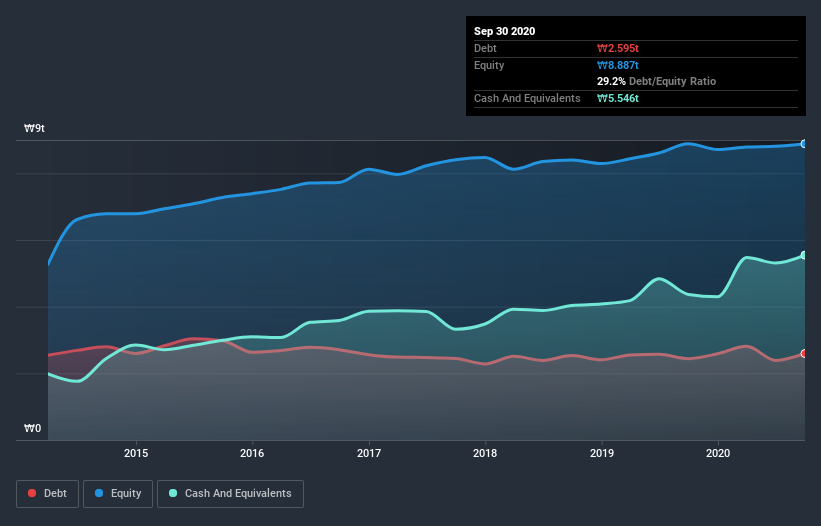- South Korea
- /
- Construction
- /
- KOSE:A000720
Hyundai Engineering & Construction (KRX:000720) Has A Pretty Healthy Balance Sheet

Howard Marks put it nicely when he said that, rather than worrying about share price volatility, 'The possibility of permanent loss is the risk I worry about... and every practical investor I know worries about.' It's only natural to consider a company's balance sheet when you examine how risky it is, since debt is often involved when a business collapses. Importantly, Hyundai Engineering & Construction Co., Ltd. (KRX:000720) does carry debt. But is this debt a concern to shareholders?
Why Does Debt Bring Risk?
Generally speaking, debt only becomes a real problem when a company can't easily pay it off, either by raising capital or with its own cash flow. In the worst case scenario, a company can go bankrupt if it cannot pay its creditors. However, a more frequent (but still costly) occurrence is where a company must issue shares at bargain-basement prices, permanently diluting shareholders, just to shore up its balance sheet. Of course, the upside of debt is that it often represents cheap capital, especially when it replaces dilution in a company with the ability to reinvest at high rates of return. The first thing to do when considering how much debt a business uses is to look at its cash and debt together.
View our latest analysis for Hyundai Engineering & Construction
What Is Hyundai Engineering & Construction's Net Debt?
You can click the graphic below for the historical numbers, but it shows that as of September 2020 Hyundai Engineering & Construction had ₩2.59t of debt, an increase on ₩2.44t, over one year. But it also has ₩5.55t in cash to offset that, meaning it has ₩2.95t net cash.

A Look At Hyundai Engineering & Construction's Liabilities
We can see from the most recent balance sheet that Hyundai Engineering & Construction had liabilities of ₩6.59t falling due within a year, and liabilities of ₩2.83t due beyond that. On the other hand, it had cash of ₩5.55t and ₩5.24t worth of receivables due within a year. So it can boast ₩1.36t more liquid assets than total liabilities.
This excess liquidity suggests that Hyundai Engineering & Construction is taking a careful approach to debt. Given it has easily adequate short term liquidity, we don't think it will have any issues with its lenders. Succinctly put, Hyundai Engineering & Construction boasts net cash, so it's fair to say it does not have a heavy debt load!
It is just as well that Hyundai Engineering & Construction's load is not too heavy, because its EBIT was down 28% over the last year. When a company sees its earnings tank, it can sometimes find its relationships with its lenders turn sour. The balance sheet is clearly the area to focus on when you are analysing debt. But it is future earnings, more than anything, that will determine Hyundai Engineering & Construction's ability to maintain a healthy balance sheet going forward. So if you're focused on the future you can check out this free report showing analyst profit forecasts.
Finally, while the tax-man may adore accounting profits, lenders only accept cold hard cash. While Hyundai Engineering & Construction has net cash on its balance sheet, it's still worth taking a look at its ability to convert earnings before interest and tax (EBIT) to free cash flow, to help us understand how quickly it is building (or eroding) that cash balance. Over the last three years, Hyundai Engineering & Construction recorded free cash flow worth a fulsome 87% of its EBIT, which is stronger than we'd usually expect. That puts it in a very strong position to pay down debt.
Summing up
While it is always sensible to investigate a company's debt, in this case Hyundai Engineering & Construction has ₩2.95t in net cash and a decent-looking balance sheet. And it impressed us with free cash flow of ₩1.0t, being 87% of its EBIT. So we don't think Hyundai Engineering & Construction's use of debt is risky. There's no doubt that we learn most about debt from the balance sheet. However, not all investment risk resides within the balance sheet - far from it. Case in point: We've spotted 3 warning signs for Hyundai Engineering & Construction you should be aware of.
When all is said and done, sometimes its easier to focus on companies that don't even need debt. Readers can access a list of growth stocks with zero net debt 100% free, right now.
If you decide to trade Hyundai Engineering & Construction, use the lowest-cost* platform that is rated #1 Overall by Barron’s, Interactive Brokers. Trade stocks, options, futures, forex, bonds and funds on 135 markets, all from a single integrated account. Promoted
Valuation is complex, but we're here to simplify it.
Discover if Hyundai Engineering & ConstructionLtd might be undervalued or overvalued with our detailed analysis, featuring fair value estimates, potential risks, dividends, insider trades, and its financial condition.
Access Free AnalysisThis article by Simply Wall St is general in nature. It does not constitute a recommendation to buy or sell any stock, and does not take account of your objectives, or your financial situation. We aim to bring you long-term focused analysis driven by fundamental data. Note that our analysis may not factor in the latest price-sensitive company announcements or qualitative material. Simply Wall St has no position in any stocks mentioned.
*Interactive Brokers Rated Lowest Cost Broker by StockBrokers.com Annual Online Review 2020
Have feedback on this article? Concerned about the content? Get in touch with us directly. Alternatively, email editorial-team (at) simplywallst.com.
About KOSE:A000720
Hyundai Engineering & ConstructionLtd
Hyundai Engineering & Construction Co.,Ltd.
Undervalued with solid track record and pays a dividend.
Similar Companies
Market Insights
Community Narratives




